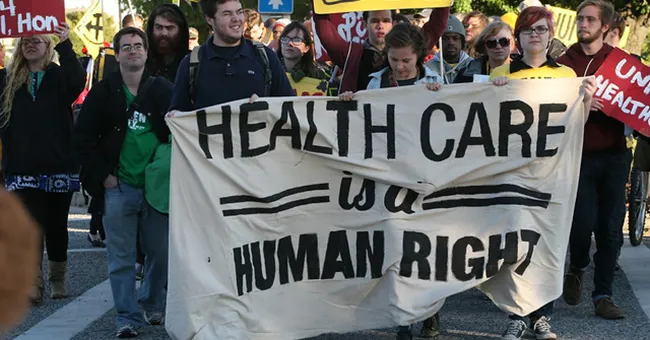
[image source: https://www.beaconbroadside.com/broadside/2020/03/unifying-around-universal-healthcare.html]
This week I got to watch Dr. Sean Flynn's talk on Universal Healthcare. I found it really interesting, and really enjoyed it. He brought up a lot of good points that I had not thought of before and I liked a lot of the things he had to say. It was really interesting hearing the way he has framed the problem with the healthcare system and the solutions to it.
The U.S. Universal Healthcare is a mess. It is not sustainable and it causes more problems than it helps. There are so many people who cannot access life-saving procedures without bankrupting costs. However, something he brought up that I had not really thought about was the curse that is private insurance. I was aware of the many problems that lay with insurance but hearing the way he connected them to the problems of the healthcare system was like a little lightbulb going off in my head - I was like, oh yeah, duh, that makes sense. It is so insane to me that people don't know the prices of things that they have to get. I guess that's part of it though, it does not matter how expensive it is if it has to happen and it'll be the same just about anywhere. However, the idea that the hospital and the insurance will just go back and forth, pick a number, and then the insurance will start charging you - that is insane. He was right, applying that system anywhere else just highlights how ridiculous it is.
Using Singapore as an example about how things could be (and, as he argues, should be) is something I really would have never even thought of. Something I really liked about his talk was how he kept emphasizing was that he wasn't just make these comparisons in hypotheticals, there were already systems in the U.S. that were replications of how Singapore handles their healthcare. I also liked that he made a point to say that it would be incredibly easy to size up Singapore's system to fit the population of the U.S., something that absolutely needs to be taken into account. His idea of creating a competitive market system similar to the one in Singapore to help make things more affordable - and therefore accessible - is really interesting and I like the idea of it. Especially after he made the point that we are already implementing in it the healthcare sector with elective surgeries. Insurance does not cover things like Lasik or cosmetic surgeries so patients can go to doctors they can afford. Expanding this concept to all of healthcare could do a lot to combat the issues that are so prevalent today. It would also help combat issues that could pop up if we implemented a single-payer system - specifically with things like wait times. By encouraging a competitive market amongst healthcare, if people are so desperate for a surgery and they need is as soon as possible, they would be able to get it for just a slightly higher prices. It's like with anything else - you want it soon and done well you can pay for that. There would still be some kind of government regulation for this system so it does not get too out of hand and become corrupt or a monopoly but there is a lot of potential - especially since it is already working in Singapore.
Overall, I really enjoyed listening to him speak. He did a good job at explaining everything and making things make sense. I can still see some issues that could pop up, the same issues that generally pop up with any kind of competitive market, but by having some form of governmental regulation, this is a plausible solution to the current nightmare that is the U.S. healthcare system. Also, a little bit of a side note, found it very interesting about the history of healthcare in the U.S. and how it dates back to industrial history during the world war. Anyway, the biggest takeaway I got from this is that some kind of change needs to happen and by offering loads of different options that are affordable and accessible to all citizens in the U.S., we can help solve problems for everyone - patients, doctors, and even the government itself.
